At EERA we acknowkedge the global nature of the climate challenge. For this reason, this section aims to provide an overview of the latest and more relevant reports providing a thorough view on the most serious threat facing our planet today.
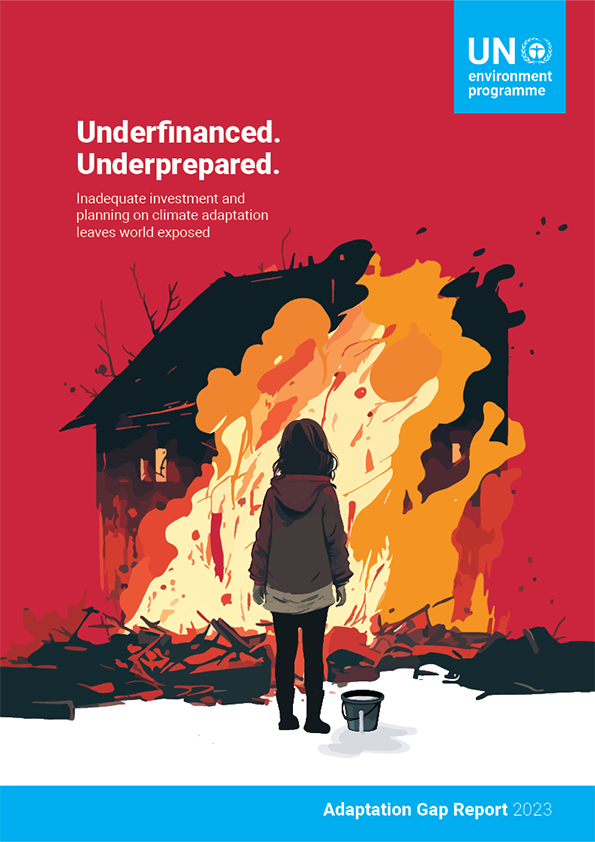
The new UNEP’s Adaptation Gap Report starkly reveals a disconnect between the growing needs and the dwindling funds in climate adaptation finance for developing countries. With the required adaptation costs for these nations estimated at USD 215 billion annually, and the need to implement adaptation priorities even higher at USD 387 billion per year, the financial strain is apparent. In contrast, international public finance flows are lagging, with only 5-10% of what's needed, and have further decreased by 15% to USD 21 billion in 2021. Consequently, the adaptation finance gap has ballooned to an estimated USD 194-366 billion annually. Amidst these daunting figures, the report notes a concerning stagnation in adaptation planning and execution, with dire consequences for loss and damage, especially among the most vulnerable populations. To bridge this chasm, the report suggests seven finance-boosting strategies, including leveraging domestic, international, and private sector funds, utilizing remittances, supporting small and medium enterprises, overhauling the global financial framework, and pioneering innovative funding through the new Loss and Damage fund.
Read more here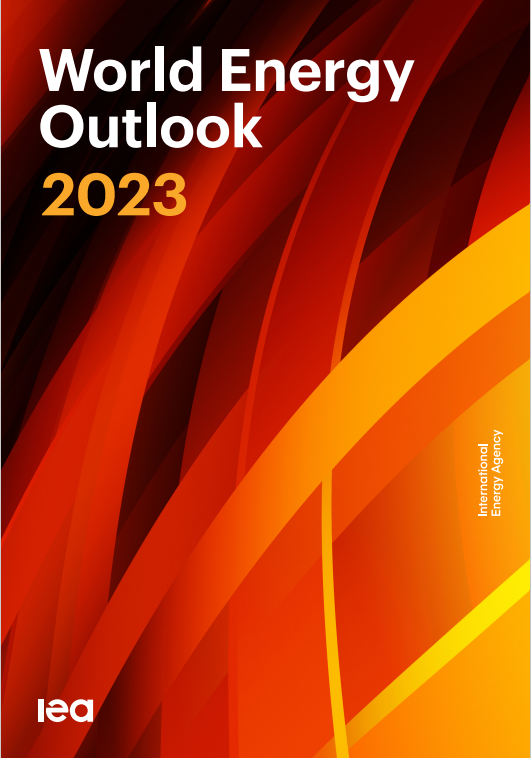
In the foreword of the recently released World Energy Outlook 2023, the International Energy Agency (IEA) says that 50 years after the oil shock initiated the IEA's formation, global energy dynamics are once again impacted by geopolitical tensions and Middle East crises. The report reveals significant shifts since the 1970s, with changes accelerating in the energy sector, influencing climate change and energy security. By 2030, projections include a tenfold increase in electric cars, renewables comprising almost half of the global electricity mix, electric heating systems surpassing gas boilers in sales, and a peak in fossil fuel demand. However, the current trajectory suggests fossil fuel demands will exceed the targets set by the Paris Agreement, aiming for a global temperature rise limit of 1.5 °C. The WEO-2023 indicates a potential 2.4 °C increase based on existing policies. The report suggests urgent strategies, including tripling renewable energy capacity, doubling energy efficiency rates, cutting 75% of methane emissions from fossil fuels, tripling clean energy investments in developing economies, and methodically reducing fossil fuel use, as a roadmap for the upcoming COP28 conference.
Read more here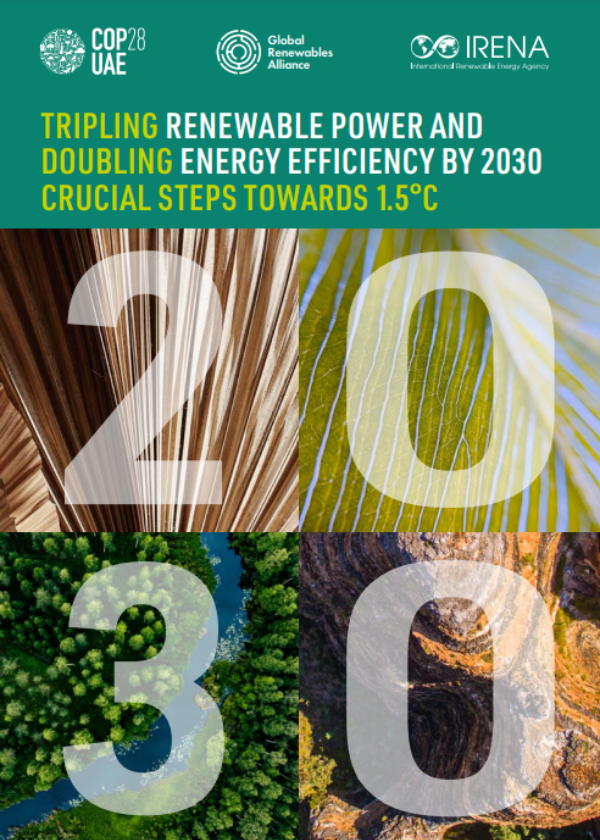
Ahead of COP28, the International Renewable Energy Agency (IRENA) released a report titled "Tripling Renewable Power and Doubling Energy Efficiency by 2030: Crucial Steps Towards 1.5 °C." Based on IRENA's World Energy Transitions Outlook 2023, the report highlights five key enablers: infrastructure and system operation, policy and regulation, supply chain skills and capacities, scaling-up finance, and enhancing international collaboration. It offers policy recommendations to achieve a minimum of 11,000 GW renewable energy capacity and double the annual energy efficiency improvements by 2030. Launched during the Pre-COP meeting in Abu Dhabi, the report is designed to guide global climate negotiations. COP28 President, Dr. Sultan Al Jaber emphasized the importance of tripling renewable energy and doubling energy efficiency to reduce emissions. IRENA's Director-General, Francesco La Camera, stressed the urgency of the mission, highlighting systemic barriers and the need for radical collective action to stay on the 1.5 °C path.
Read more here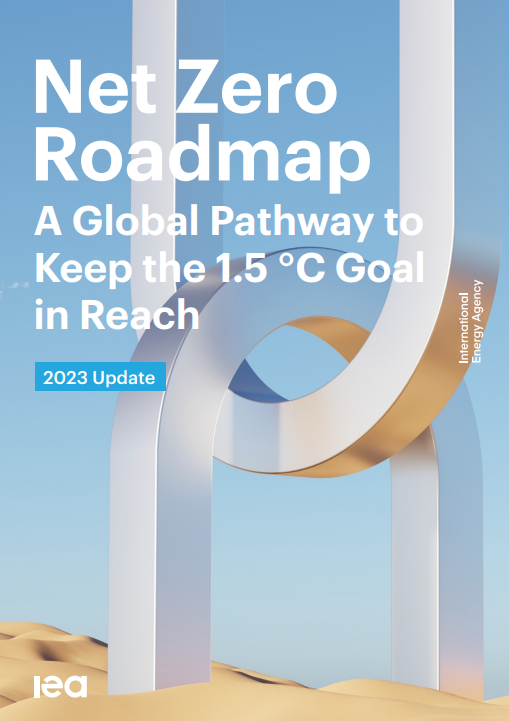
In the recently released update to the IEA’s seminal Net Zero Roadmap, a pressing call is made for major polluters to speed up their shift away from fossil fuels. The report downplays the impact of carbon capture and hydrogen, citing them as “underperforming” in realising the Paris Agreement objectives despite advancements made. The IEA advocates for a focus on more viable and cost-efficient solutions like renewables and energy efficiency. Subsequently, the forecasted contribution of carbon capture to emission reductions has been lowered by about 40%, and the prevailing pollutant-intensive production methods of hydrogen have been criticised. The IEA proposes that affluent nations should attain net zero emissions by 2045, spearheaded by developed economies. Conversely, the projections for solar power and electric vehicles have been favourably revised upwards due to their potential. The document underscores the necessity for equitable transitions and varying responsibilities and is anticipated to impact national contributions to the Paris Agreement in the forthcoming 2025 updates.
Read more here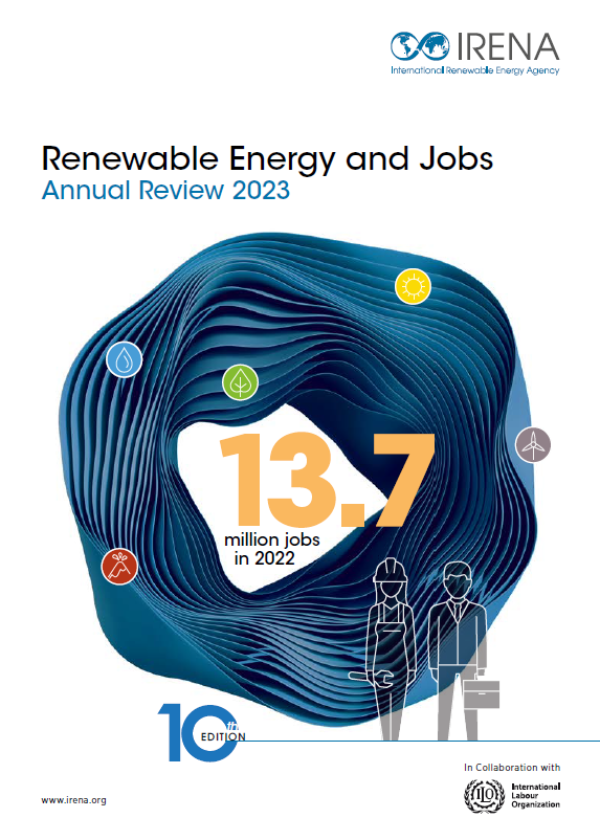
The tenth edition of IRENA’s Renewable energy and jobs: Annual review, produced in collaboration with the International Labour Organization (ILO), provides the latest estimates of renewable energy employment globally and an overview of the renewable energy employment landscape as of 2022. The report highlights growing interest in localising supply chains, driven not only by concerns about possible disruptions due to natural disasters, trade disputes or geopolitical rivalries but also by interest in boosting domestic value creation and jobs. Numerous countries are adopting industrial policy strategies to this end, while many resource-rich countries are taking steps to move beyond being suppliers of raw materials. The report emphasises that education and training programmes must be expanded to prevent the widening of skill gaps. Such measures must be paired with efforts to tap talent among under-represented groups including women, youth and minorities. It also notes that labour rights and social dialogue are indispensable for an energy transition that produces a truly just transition for all. Achieving the energy transition in a manner consistent with climate stability requires much faster renewables’ deployment, in turn creating more jobs; but it also demands broader, systemic change, to make the economy more compatible with planetary limits.
Read more here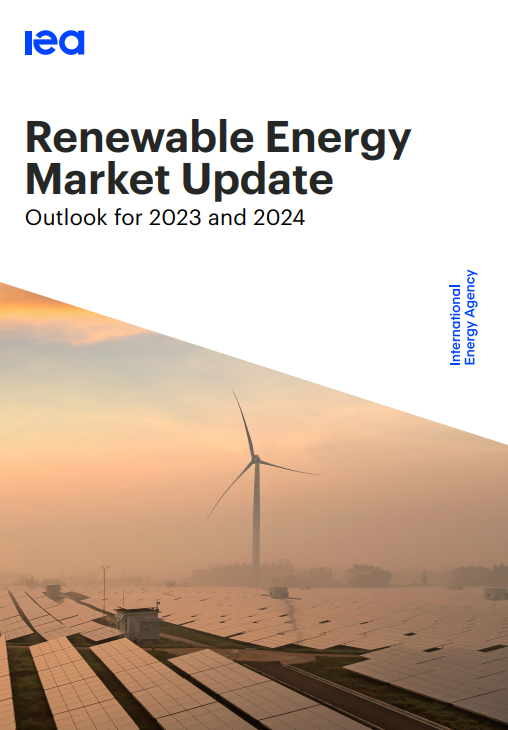
The International Energy Agency (IEA) predicts a global addition of approximately 440 gigawatts (GW) of new renewable capacity this year, representing a growth rate one third higher than the previous year. The IEA attributes this expansion to stronger government policies and energy security concerns. China is expected to contribute 55% of the overall growth in 2023 and 2024. This significant increase of 107 GW marks the largest absolute rise ever recorded, bringing the total renewable energy capacity in 2023 to over 440 GW. Reuters reports that the global renewable energy capacity is projected to reach 4,500 GW this year. The Financial Times has also covered this development. The 440 GW projection for 2023 exceeds the IEA's own December forecast by 24%.
Read more here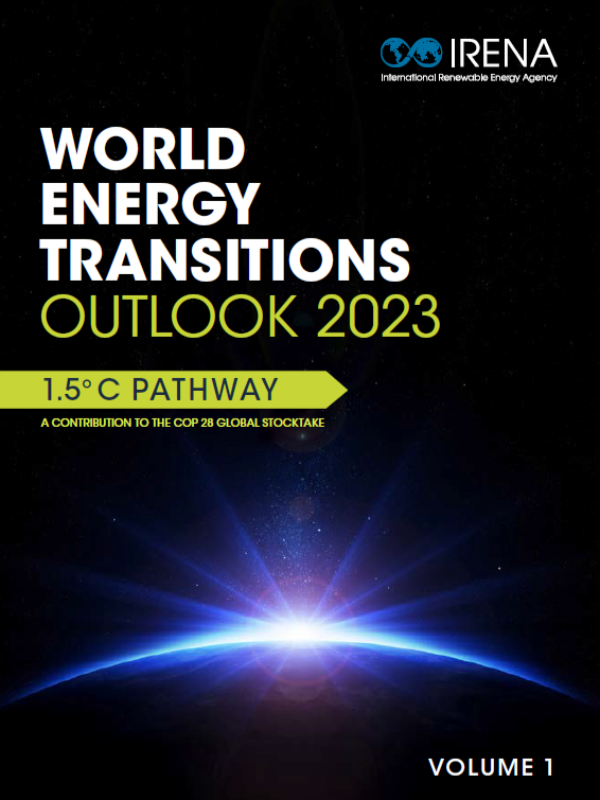
In the Volume 1 World Energy Transitions Outlook 2023 report, the International Renewable Energy Agency (IRENA) emphasizes the need for increased global ambitions in renewable energy to align with the 1.5°C climate target. While progress has been made, especially in the power sector with a record 300 GW of global renewable capacity added in 2022, there is still a significant gap between achieved and required targets. To bridge this gap, the report calls for an annual addition of 1,000 GW of renewable power capacity by 2030, along with greater utilization of renewables in end-use sectors. IRENA's Director-General highlights that renewable energy is a central solution not only for climate change but also for energy security, cost reduction, and inclusive industrial development. The upcoming COP28 and Global Stocktake are expected to provide a strategic blueprint to realign with the 1.5°C pathway. The report identifies barriers such as lack of physical infrastructure, inadequate policies and regulations, and skill and capacity misalignments. It also underscores the importance of international cooperation and funding to support a just energy transition.
Read more here![]()
A new report jointly released by the International Energy Agency (IEA), the International Renewable Energy Agency (IRENA), the United Nations Statistics Division (UNSD), the World Bank, and the World Health Organization (WHO) reveals that the world is not on track to achieve Sustainable Development Goal (SDG) 7 for energy by 2030. SDG 7 aims to ensure universal access to affordable, reliable, sustainable, and modern energy. While there has been some progress, such as increased renewable energy adoption in the power sector, it falls short of the SDG targets. Challenges like mounting debt and rising energy prices impede advancements in attaining universal access to clean cooking and electricity. Projections indicate that by 2030, approximately 1.9 billion people will lack access to clean cooking facilities, and 660 million will be without electricity. These gaps not only adversely impact public health, particularly among vulnerable populations, but also contribute to climate change. The report calls for structural reforms in international public finance and the creation of new investment opportunities to meet the targets set by SDG 7. It emphasises the urgency to address the limited funding for clean energy initiatives in low- and middle-income countries and urges policymakers to prioritise support for vulnerable nations. The report is scheduled to be presented at a special launch event in July 2023, where it will be shared with key decision-makers. The event aims to underscore the significance of preserving the progress made thus far and advocating for necessary structural reforms to advance the SDG 7 agenda.
Read more here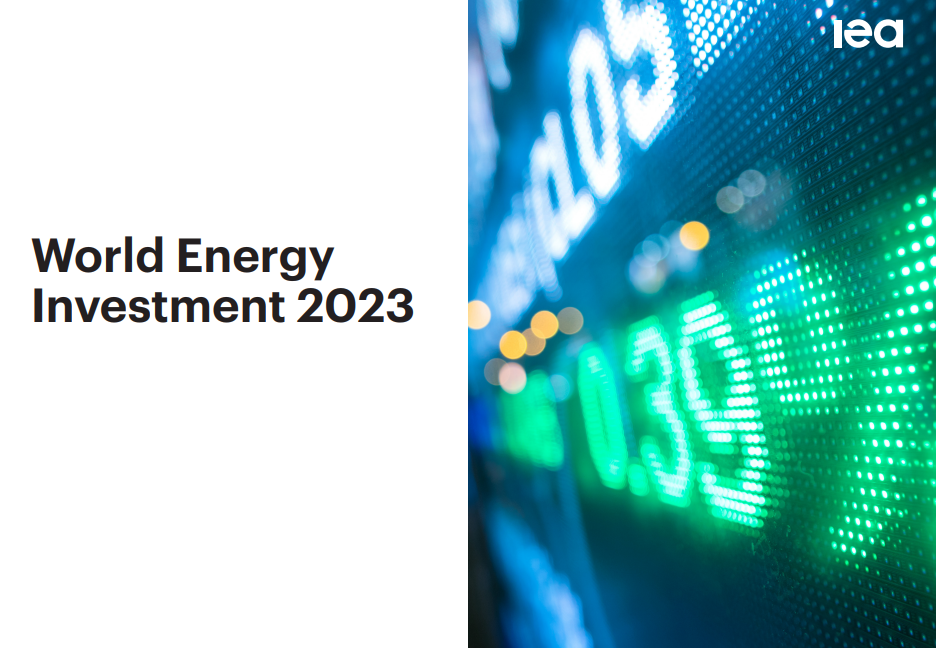
According to the latest World Energy Investment 2023 report from the International Energy Agency (IEA), global investment in solar power is expected to surpass spending on oil production for the first time this year. The report indicates that if clean energy investments continue to grow as they have in recent years, it could lead to a significant transformation in the global energy system and help maintain the goal of limiting the temperature increase to 1.5 degrees Celsius. The IEA estimates that $1.7 trillion will be spent on clean technologies in 2023, compared to $1 trillion on fossil fuels. However, the report highlights that the current investment mix is insufficient to meet climate commitments and transition to low-carbon sources at the necessary pace. The IEA also notes that Russia's invasion of Ukraine has contributed to a funding boom for clean energy, driven by concerns about energy security and volatile fossil fuel prices. Despite the progress in renewable energy investment, challenges related to grid connection remain a significant barrier to its expansion.
Read more here
The Energy Technology Perspectives series is the IEA’s flagship technology publication, which has been key source of insights on all matters relating to energy technology since 2006. ETP-2023 will be an indispensable guidebook for decision-makers in governments and industry seeking to tap into the opportunities offered by the emerging new energy economy, while navigating uncertainties and safeguarding energy security.
Read more here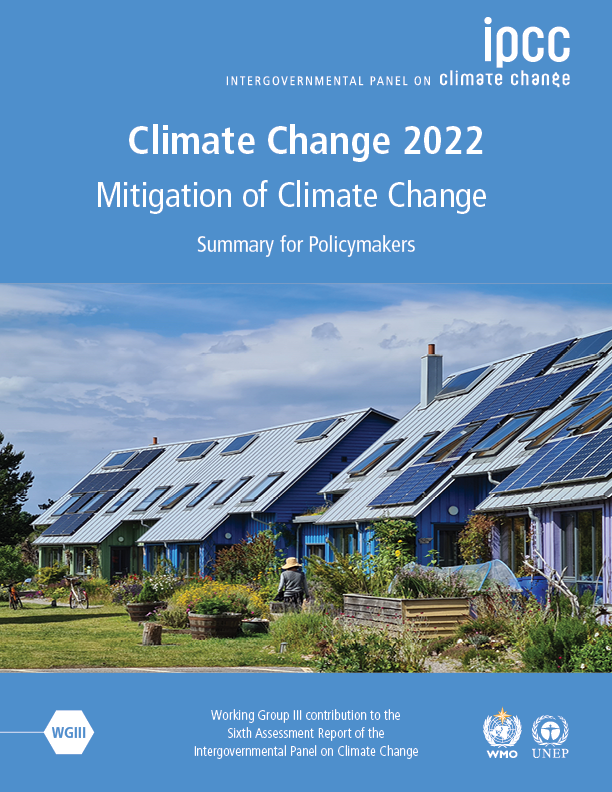
The third part of the Sixth Assessment Report (AR6), Climate Change 2022: Mitigation of Climate Change, the Working Group III contribution, provides an updated global assessment of climate change mitigation progress and pledges and examines the sources of global emissions based on the literature published after 2015 when the previous IPCC AR5 report was released. It also discusses what humans can do to mitigate climate change.
Read the full report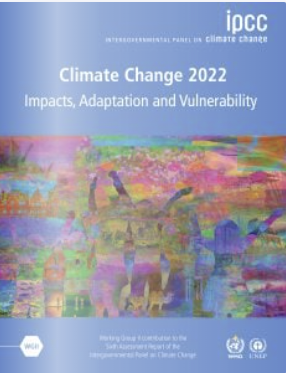
Monday 28 February 2022, the Intergovernmental Panel on Climate Change (IPCC) released the second report of the Sixth Assessment on Climate Change evaluating the impacts of climate change, looking at ecosystems, biodiversity, and human communities at global and regional levels. It also reviews vulnerabilities and the capacities and limits of the natural world and human societies to adapt to climate change.
The AR6 is the work of 270 authorities, from 67 countries, reviewing 34,000 scientific papers. The report contributes significantly to a growing scientific knowledge on the risks, impact, best solutions and limits to adaptation. In total, 127 key risks have been identified to have an impact on a wide range of sectors, native species and people's well-being.
The report is divided into three parts meant to inform and advise policymakers on sustainable pathways and limits to adaptation:
- Observed and Projected Impacts and Risks
- Adaptation Measures and Enabling Conditions
- Climate Resilient Developments
IPCC - AR6 Climate Change 2021: The Physical Science Basis
Net Zero by 2050 - A Roadmap for the Global Energy Sector 2021
World Energy Transitions Outlook: 1.5°C Pathway 2021
SAPEA - A systemic approach to the energy transition in Europe
World Energy Outlook 2021 (IEA)
The Production Gap - 2021 Report